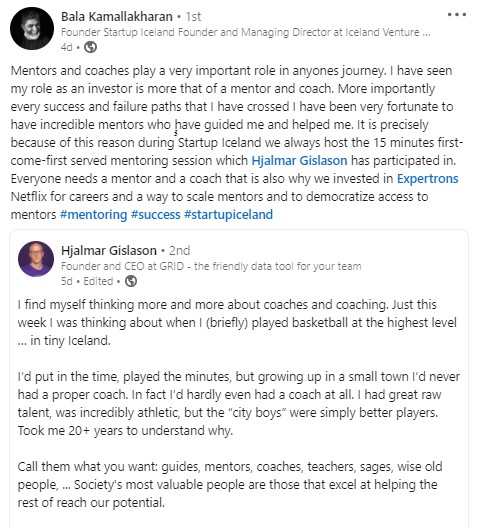When I began writing this article about how investors and VCs view founder coaching, I had no idea I would end up in investigative journalism.
For that reason, you should know the full context before the multiple views you’ll find below. If you’re in a hurry, you can jump right into the quotes I gathered (at the end of the article), but I hope you decide to read the full article.
Table of Contents
Why is this topic about VCs, investors, and founder coaching?
My intention with the articles on this blog is to shed some light on meaningful or sensitive questions for founders. Topics that are chosen are those that come up during coaching or conversations.
Because my main focus is on VC-backed founders, it’s easy to see the linkage. Founder coaching and having a coach, any coach, is a concern many founders are raising behind closed doors.
I’m not the only coach who caught this as a recurring topic. In fact, I believe all top executive coaches or founder coaches faced this, especially those who work with funded startups.
Therefore, I researched this article thoroughly to present you with a complex point of reference. Once I figured out that this is almost like a first aid topic to many funded founders, and there isn’t enough information for them to end their turmoil, I decided to ask VCs and investors to answer this question for them.
The founder’s dilemma about executive coaching
Yes, in the twenty-first century, when we have so much access to information, and we know all the benefits and ROI of coaching and mentoring, having a coach is still a taboo topic for many people.
During the years, I discovered all kinds of situations where the level of information to enable the right decision about coaching is lacking, even at a basic level.
Founders are humans, meaning they have their fears. Especially founder CEOs fear the idea that having a founder or an executive coach is a sign of weakness. Once they get the funds, and a master plan to achieve the desired heights, often equivalent to becoming a unicorn, they are seen as superhumans who can deal with anything, and perform under any conditions.
Being a founder CEO is a lonely journey
I must say that, at least on this topic, you can find a lot of documentation already. Many founder CEOs agree that this is a lonely journey, even if you have a co-founder, board, good employees, and a supportive family. I can also attest to this since I was one.
Together with their status, a new alter ego forms where they feel obliged to fulfill everyone’s expectations and do their part without showing they might need help, other than funds, tech, sales, or people.
Showing any sign of weakness to anyone, especially VCs, when it comes to mental health, mindset and emotions can make them very anxious. I see this not only with the first-time founders but up to any level.
Tech founders and coaching
A vulnerable area is today’s tech. There are many founder CEOs with a technical background. It’s not difficult to figure out that with today’s interest in tech and AI, many technical people got into this seat, where human-oriented aspects are not their strong suit. “What’s founder coaching?” – they would ask.
They had less exposure to coaching, human sciences, personal development, and even leadership development. They caught some ideas and benefited from a former company’s training and coaching programs, or accelerators and incubator programs, but choosing on their own to have a personal executive coach is still a big jump to take.
Mindset and personality traits don’t just change overnight.
But a founder CEO requires a lot more skills than knowing how to code or deliver a product. In fact, you can be a great non-technical CEO in a tech company if you have a technical co-founder.
The founder’s dilemma continued
There is also another category that knows the benefits of coaching but still doesn’t want to associate themselves with doing it, so they treat it like a personal expense out of their salaries. It’s their choice, of course, but it says a lot about how we still see psychological needs addressed in a startup.
Other founders don’t know that executive coaching is much more than having a support system or leadership coaching.
They don’t realize that many good coaches are actively involved in their daily issues, from crucial business decisions to mitigating conflicts and clarifying the next steps for the business. And even the most business-oriented coaches will get into personal life issues because you cannot ignore those. If your house is a mess your business will be affected.
The best coaches have startup experience themselves, and so they are talking from the trenches.
A special emphasis on mental health
Today, you can find coaches exclusively focused on mental health, and it’s an overseen part that plays a crucial role for a founder to be successful, healthy and fulfilled.
Even if we consider the improved decision-making process that comes out of a healthy mind, you can justify the ROI. One bad decision can destroy startups. I could write a separate article about this, just listing them. A founder CEO with mental health issues is a high risk. S(he) can take wrong decisions s(he) cannot correct.
Mental health is a big issue.
One of my frustrations about our society and the times we are leaving is that we are in the most prosperous and peaceful times if you study history, but we are the unhappiest.
With all the advances, we managed somehow to see and extract the bad more percentage-wise and bury the good, giving the illusion of negativity all around while alienating our youth about their prospective future.
We have everything today to succeed and be happy, yet we aren’t. Mental health problems are constantly increasing, and there is no visible end to them yet.
“According to a study by Michael Freeman, entrepreneurs are 50 percent more likely to report having a mental health condition, with some specific conditions being incredibly prevalent amongst founders.
Founders are:
· 2X more likely to suffer from depression
· 6X more likely to suffer from ADHD
· 3X more likely to suffer from substance abuse
· 10X more likely to suffer from bi-polar disorder
· 2X more likely to have psychiatric hospitalization
· 2X more likely to have suicidal thoughts
Addressing the ongoing mental health catastrophe in entrepreneurship is a moral imperative, and for wise investors, it should be a function of doing business.
Venture capitalists make their living off the blood, sweat and tears of founders. It is through their passion and efforts that we succeed or fail. We can either choose to see founders purely as a means to an end (generating returns) or we can see them as the whole people they are.“
TechCrunch – a must-read article
You’re never done as a founder or CEO
The following quote comes from the prestigious executive coach, Alisa Cohn, and I find it very well articulated:
“You can be a successful CEO with all different behaviors and styles. You can be loud, you can be soft, you can be charismatic. But what’s consistent is the need to change as the company grows.
If you’re a quiet CEO, you might need to bring much stronger and more extroverted communication skills when you’re recruiting, fundraising, or talking to the press. If you’re more externally focused, you’re going to have to focus more internally on culture and organizational issues as the team grows.
As the founder, you need to be self-aware enough to realize when the company requires something different from you. And if you don’t, the culture just kind of grows around you — and it’s not always a good fit for the kind of company you’re trying to build.”
First Round Review
Questions from founders
To conclude with the overview of founders, here are some quotes and questions we in the coaching seat often heard during the years:
“Should I have a coach? Why?”
“I know nothing about coaching. What can you do?”
“Every founder CEO should have a coach?”
“I just don’t know. Should I pay this from my salary? Is this a business expense?”
“Isn’t this too expensive to be justified? I’m not sure.”
“I think I can manage things alone.”
“Do you know how many seed (or series A, B) founders have a coach? What type of coach do they have? Is there a difference?”
“What’s the opinion of investors about coaching?”
“How do I know if I need coaching? “
“Isn’t this a weakness for those who don’t know how to manage stress?”
And, here is a nice story from a founder who mistook his work for self-worth, coming from another fellow coach, Dale Stephens .
Writing this article | Behind the curtains
I thought writing this article will be easy. In one week, I said, everything will be laid out to provide accurate and multiple answers to bring some light to the topic.
As a side note, I’m a fast doer.
The intention was to quote a diversity of VCs and investors I have in my network, some in my close network, to answer the question: What VCs and investors are thinking about founder coaching? Is this a frivolous expense? – without me altering anything, good or bad. I focused on the truth and multiple perspectives to give founders a good resource for reference.
Thinking that my network is large, I got overly optimistic. By the way, this (optimism) is a typical trait of a founder.
Instead, it took me more than three weeks to document and write on this topic.
Why?
Partly you already have the answer from what you saw above. I discovered this is still a sensitive topic for too many, and being openly quoted was not so comfortable. The challenge only made me dig more. I needed to find out what’s happening without giving up on this article.
These three+ weeks were tough.
It took multiple layers of switching conversations to get enough insights to be a reliable article to be quoted. The amount of messages, emails, and conversations I needed to open and then continue was dazzling. At some point, I really felt like a genuine journalist digging out hidden secrets on a hard-to-get story.
I didn’t follow up on every single dead-end conversation but enough to have a full picture. After all, this is a passion project, not my job. A lot of work for one person who has a busy schedule. Luckily, I have the forensics hobby that helped.
I switched back and forth in more or less debt with 78 prospects. I would say that’s a lot of time investment. And, of course, I didn’t escape from being ghosted, as you might figure. It’s never fun or pleasant, but it’s just something you must face when digging for the truth. It’s also a great way to see who is practicing what they preach, but that’s another story if I would write I would need to hide. 😊
Quoting VCs anonymously
To make sure I covered all grounds, I offered an anonymous option highlighting that they can write anything. It doesn’t matter if they write positives or negatives about how they feel about coaching. I only want their honest views to provide a pool of answers to the founders. It didn’t count with one exception. Who wanted to answer answered without any courting or petting. I am so grateful for them. Thank you!
It was clear to me that more needs to be written on this.
To emphasize what I wrote, here are some answers I got:
“Coaching kept some of our founders sane, but please don’t quote me.”
“I mean, I do know how important coaching is, but I cannot put my name on it.”
“I cannot be quoted, it’s not aligned with my brand image.”
“I would love to help, but I’ll need to pass this.”
“Thank you, but I’ll pass this.”
“Not interested.”
“I don’t want to comment on this topic.”
“I never had a coach, so I cannot answer.”
“I want to help other women when I can, but this sounds promotional.” 🙂
………..(the sound of silence).
And this one is an interesting one that I got permission to share:
“Due to a situation we faced, I am more cautious when discussing coaching expenditures. A startup from our cohort used a big amount of money on consultation and coaching. The co-founders justified it well and we were OK with their reasoning.
Later, in a peculiar way, we found out that the executive coach was a good friend of the founders, and it was a way to extort some venture capital. They split the money without any hour of coaching. Not hard to figure out that the startup in question isn’t one of our best assets. But true, that’s an isolated incident we needed to chew on internally.
Otherwise, we don’t have anything against genuine coaching, but I would love to keep my name out of this.”
Anonymous (General Partner – Early Stage VC)
Open views about founder coaching
As stated, it’s not just me, but other top coaches are dealing with this question from founder CEOs. You can see this pinpointed in a great article from Sifted: The existential loneliness of the founder CEO.
When Mikela Druckman, cofounder and CEO of Greyparrot, first thought about getting a coach, she says it seemed like “a luxury”. Her company was at the seed stage, and she wasn’t sure how it would look to investors.
“One of the concerns I had was whether this was going to be viewed as a frivolous expense by investors. Will it be value for money?” Ben Stephenson, CEO and cofounder of Impala.
Sifted
Ariane de Bonvoisin shares her views in a comprehensive article that worth’s reading because it also comes from the trenches: Investors and business leaders: It’s time to take coaching mainstream. This parts says it all:
I coach founders and CEOs of startups, and more than half their main life challenges are not work related. And when a problem is work related, it’s often a communication or psychological issue: How do I face my fear of failure? How do I lead a team of 50 for the first time? Should I trust my gut?
TechCrunch
All this is happening in the midst of Series A raises, hiring and firing employees, acquisitions, and deciding whether to bridge or shut down the business. Imagine how much emotional energy and hours it takes for founders — or anyone, really — to face those intimate issues in isolation while putting on a brave face with investors or at board meetings.
Many of us come from the business world as former founders, so we know both worlds and how it can feel from the other side.
“I remember when I first hired a coach, while I was running VNN. It felt like something I had to hide. Like I was admitting I needed help, like I couldn’t do the job on my own. But over time I got over that and finally began to open up, and thus begun what has been the most transformational leadership journey of my life.
Leaders cannot see what’s right in front of them (the best ones admit it). Coaching is becoming an unfair advantage for top entrepreneurs.”
Ryan Vaughn – 3x founder and former CEO, now executive coach.
And top executives know that as well.
“I never cease to be amazed at the power of the coaching process to draw out the skills or talent that was previously hidden within an individual, and which invariably finds away to solve a problem previously thought unsolvable.”
John Russell – the former VP of Harley-Davidson Europe
(Yes, I've been a Harley Davidson fan since high school. Not many brands can brag about clients wearing their logo as a tattoo. That says a story by itself.)
VC views in the open about founder coaching
Even though there are not many who actively spread the word about the importance of their founder’s coaching, there are still some.
YC, for example, has its own coach, Amy Buechler.
“Some funds, like Human Ventures or Primary Ventures, have dedicated leadership development coaches on staff.”
Forbes
The same goes with Union Square Ventures
byFounders, launched a coaching program to help protect founders’ mental health.
“No matter how experienced you are in your career, a strong coach can be a game-changer for every executive. Make sure your coach has experience working with people like you and understands your professional world.”
PillarVC
Felicis Ventures launched a program that commits 1% on top of every check the firm writes in non-dilutive capital earmarked for “founder development” in coaching and mental health.
Brian Garrett, from Crosscut Ventures, partnered his venture with a coaching firm to coach their portfolio of early-stage startups to support their founders and portfolio companies. But he also took the journey himself.
He was also pretty early in this when most ventures didn’t consider coaching at all. Today Crosscut commits at least one percent of all capital invested toward leadership development, coaching, and founder mental health.
Last words before the quotes
I want to show gratitude to all those willing to share their views on founder coaching. I understand that there are politics involved and other undiscussable issues that make some uncomfortable, but speaking out it’s the right thing. We are far from where we should be.
This is not about promoting coaching, or my services, but leveling the field where secrecy and shame still exist.
We are living in a society where we worship hardship, pain, struggle, and heroes. It’s almost like, if you don’t have a movie-like crazy story about how much you struggled to get somewhere, you’re not worthy to receive success and happiness.
Are we nuts? We promote unhappiness on the scale. “Do it on your own. You are the CEO. You need to handle this and that, no matter what.”
Founders are not superhuman. No one is. In reality, no title protects you from everything. Everyone is dealing with multiple issues inside.
What VCs and investors are thinking about founder coaching? Is this a frivolous expense?

“Everyone is thinking about founder coaching. The ability to make great decisions is the sole driver of compounding returns with respect to a company’s growth, and it happens in a variety of ways:
Investors: investing resources into the team in exchange for equity (capital, platform support like software perks, customer introductions, recruiting help, partner relationships, and much more)
Advisors: investing time in exchange for equity (YC has an agreement known as “FAST” which outlines the level of commitment and impact that is helpful for founders as well as the equity that it warrants)
Accelerators: investing money along with providing a dedicated program created to help founders make progress and raise capital, heavily focused on coaching and classroom or webinar style content (a standard market offer ranges between 100K-400K for 7-10% equity stake)
Residencies: joining other founders or funds to build with the resources of a company behind you, sometimes for free and sometimes with a salary (the best examples are Antler and Entrepreneur-In-Residence roles. Value is frontloaded where investment and equity are exchanged after the founders, product idea, and market are validated)
Mentors: having a deep network will usually yield a number of great operators who can help you, out of the goodness of their hearts (asking for introductions often yields outsized results without giving away equity as you would with formal advisors)
As for the question of whether or not these are frivolous expenses, it really depends on the founders’ strengths and weaknesses as well as where they are in their journey.
If I were starting a company today, I would choose Antler. In today’s venture environment, a founder residency is the best way to go from zero to one with low cap table risk and the end-to-end support from idea to IPO.”
Jeff Becker, General Partner at Antler

“Founder coaching is like having a personal trainer for your professional life. It is always a nice to have, but at specific points in time it is can be of such value that is almost a necessity.”
Tom Horsey, Business Angel and very early-stage VC investor (MVP+)

“I am actually working with a VC fund here in Atlanta to launch a pre-seed accelerator program focused specifically on minority Founders. Why? Because founder coaching is key to successful investments.
The fact is most Founders have never had to scale a business post-investment. And board accountability can become overwhelming. Let’s be honest, founders know what they know, and they are good at it.
But when it comes to HR, accounting, finance, marketing or other key business areas, coaching is critical for success.”
Wesley Owens, Managing Partner of Capstone Capital Partners & CEO of OmniPro Outsourcing

“Founder coaching and/or therapy is something we recommend for every founder. We used to offer free 6-month founder group coaching (think AA but for founders) under our nonprofit SoGal Foundation.
From our 7 years of investment experience, it’s clear that whatever trauma and childhood issues you haven’t resolved will show up in your business big time.“
Pocket Sun, Co-Founder & Managing Partner at SoGal Ventures

“I’ve written before about CEO coaches. I’m a big fan of the work they do and how they can help entrepreneurs work on things that are holding them back from being the best leaders they can be.
I encourage most of the CEOs I work with to get mentors or coaches (or both).”
Fred Wilson, Managing Partner, Union Square Ventures

“Founder coaching is an investment, not an expense. But I would not expect any founder to pay for it.
Mentors, investors, board members, ex-founders; there should be enough ‘coaching talent’ in the ecosystem to support this; no founder should pay for it; but build their network with people that can support them. Compensate with stock options, investment opportunities; but not pay in cash.“
Christian Rangen, Chairman Link Venture Capital & Link Capital

“For startups to grow fast, the founder needs to grow faster. But sometimes you don’t know what you’re doing wrong, and your position of power in the company means no one will give you objective feedback.
Recently, several of the founders in our portfolio have asked us to recommend a high-quality executive coach to help them develop the skills necessary to scale their business.
When the founders in our portfolio consistently ask the same question, we listen. If it’s important to most of our founders, it’s likely a challenge for all founders.“
Jackie Vullinghs, Partner at AirTree

“Founders don’t really need any coaching but they need to have the mindset to be coach-able.
Good mentors and coaches usually play a Socratic approach to navigating the journey of company building. In my experience, having someone who does not judge the founders and a good sounding board to bounce ideas is paramount to the founding team.
Founders and CEOs usually walk a very lonely path and having someone walking with them is also very useful.“
Bala Kamallakharan, Founder Startup Iceland; Founder and Managing Director at Iceland Venture Studio
And like nice synchronicity of things, soon after Bala gave me his view, I saw this on his feed:


“I spent a year becoming a certified coach and never regret that time because I believe it is a board member’s role to help a CEO be the best version of themselves. Coaching is the best way to achieve that.
For any founder with a growth mindset, I would highly recommend coaching.”
Nicole Quinn, General Partner at Lightspeed

“I believe that as an investor, you need to have an active interest in coaching founders if you have an interest in building the startup ecosystem.”
Terrance Orr, Entrepreneur-in-Residence at Mach49

“First, being coachable and seeking, or at least being receptive to feedback is a leading trait of successful entrepreneurs in my mind.
A good coach will help you know what questions to ask, can shorten the learning curve, and prevent costly mistakes when the stakes are at their highest.
Whether that can be achieved through a coach, mentor, board member, advisor, and or friend, it can mean the difference between success and failure.“
David Kereiakes, Partner at Providence Ventures

“The Venture Capital industry is waking up to the fact that founders are many times pushed to the edge of their physical, mental and personal limits as they build their company, so we can no longer expect them to fly solo without the right coaching and support.”
David Boulton, Managing Partner at Newzone Ventures

“Startup founders are in high-pressure environments, and we ask them to build these disruptive companies that will change the world, and yet we are not really providing support on this front.
We’re putting all of it in a box for founders to deal with alone. And that didn’t make sense to us.”
Aydin Senkut, Founder and Managing Partner at Felicis Ventures

“Whether directly or indirectly, an investor will get involved in some form of founder coaching. Whether it is right away or when the founder comes calling for more money, the investor will get involved in coaching.
Either make it a structured part of your investment thesis or wait until you’re pulled into the good fight. Neither path is incorrect, and both require thoughtful planning and consideration.“
Ken Cauley, Managing Director at VestIn Capital Group

“Founders come in with a myriad of blindspots. Inevitably, having a coach helps serve the founder well by unpacking the understanding of self to team dynamics, to market opportunities.
My role as Managing Director at Techstars is more of a “super coach” that markedly improves the team performance and as result, I see a visible change in the trajectory of the companies invested. For pre-seed to seed stage companies, our investments performed better with coaching.”
Vijay Tirathrai, Managing Director, Techstars
Conclusions
Based on my findings and all the interactions I had with the 78 prospects, ghosted by 27, results that 85%-87% favor founder coaching, 20% are actively involved in encouraging coaching, and 13%-15% are not for one reason or another.
The right choices are crucial.
In much the same way you can find coaches who align with who you are and what you want, you can also find VCs and investors who share your inner views, besides the usual unicorn-hunting.
The opposite is also true.
You can find the wrong coaches or VCs and investors who can become a roadblock to your true potential as a founder CEO. Characters and the appropriate experiences to guide you are so important. You should follow your instincts if you resonate with any of the types. Those are often correct but get highjacked by fear.
Honest conversations and expectations can solve the most sensitive problems that many times stall in a company for years before something happens and you see that what you feared can be solved in one hour.
Now, don’t go to extremes. You don’t need a coach just because you are a founder, a CEO, or both. If you don’t feel the need and you don’t see the benefits, you’re resistant to it, or want to self-learn all things, go ahead.
Coaching shouldn’t be sold to you. You should already be convinced that you need a coach because the dynamic generated by conviction produces the best results. I don’t work with any clients. You shouldn’t either.
There is no one size fits all formula here. But if you know that you can do better with a coach, in all aspects of your life, or you just want that trusted voice to guide you through the journey and be the invisible counterpart you can trust with anything, then go ahead.
But choose wisely. A genuine relationship with a coach goes beyond business. It can become a lifetime relationship, and that’s a lot.
And finishing with our topic, if your stopper is what VCs or investors are saying, as you could see, that shouldn’t worry you as much. Now you have a solid reference point to guide you to the right decision.
Cristina Imre – The Founder Coach


Pingback: The Hidden Challenges Faced Today by A Funded Startup Founder CEO